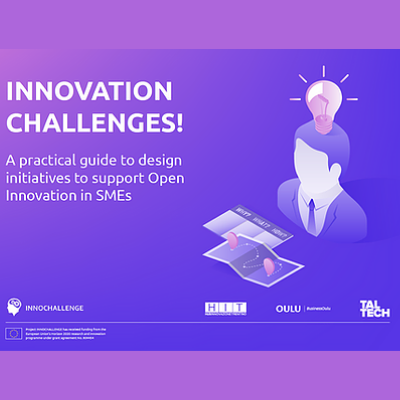INNOCHALLENGE aims at empowering Innovation Agencies with practical tools and proven know-how to better support SMEs in kick-starting Open Innovation paths.
While Open Innovation contests and intermediaries are widely adopted in large companies to source knowledge from the outside, it is not clear to what extent contests can help break down the barriers that SMEs face in pursuing Open Innovation. In this paper, researchers present the results of an action research study pivoting on an analysis of ten innovation contests that were successfully run in three European countries based on INNOCHALLENGE.The contests aimed to identify innovation opportunities through interaction of SMEs with higher education institutions, research centers, other companies, or end-users. The paper focuses specifically on innovation contests organized by innovation agencies with the aim of supporting OI processes in SMEs.An action research methodology was applied, based on analysis of a consistent number of innovation contest examples. This allowed theoretical advancements to be pursued, as well as identifying practical issues for practitioners.
The purpose of this exploratory study is to provide an initial understanding of innovation contests as appropriate instruments for supporting OI in SMEs. The paper aims to shed light on two specific research questions: (1) whether innovation contests can help break down the barriers that SMEs face in pursuing OI; and (2) how innovation contests should be designed and structured to achieve this goal.
The findings suggest that innovation contests can be viable instruments for SMEs to implement Open Innovation support policies.First, the contest cases appear to satisfy the policy requirements for effectively supporting SMEs to overcome these barriers for four resons:the relatively short time horizons of the analyzed contests;the marked involvement of university students;shifting the support focus from single firms to the Regional Innovation Ecosystems;the observed leading role of public innovation agencies in organizing and managing these initiatives within partnerships. Second,researchers propose a novel framework consisting of twelve design elements that were seen to embrace the peculiarities of the structural and design options implemented in the innovation contests object of this study. It’s robust because it’s strongly founded on the state-of-art innovation prize and contest design frameworks andit’s the result of a process of field-testing and optimization based on 10 real-life applications, together with further evaluation by 48 potential users.
These initial observations, though based on an explorative and qualitative study, carry significant implications for policymakers, at the regional, national, and European levels. Innovation agencies and development authorities whose missions include supporting innovation in SMEs should include innovation contests in their toolkits to support Open Innovation in SMEs. They should also undertake experimentation within their contest policies, as recommended by the European Commission.Furthermore,governing authorities should consider launching and facilitating capacity building programs aimed at further validating and mainstreaming innovation contests as effective, feasible, and scalable SME OI policy instruments
More information:
Learn more about the innochallenge project here
Read more about the paper here
View the organisation of the main author Hub Innovazione Trentino here
